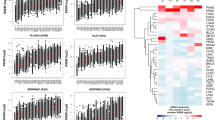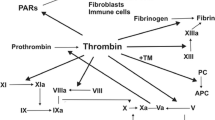Abstract.
In human patients, blood coagulation disorders often associate with cancer, even in its early stages. Recently, in vitro and in vivo experimental models have shown that oncogene expression, or inactivation of tumour suppressor genes, upregulate genes that control blood coagulation. These studies suggest that activation of blood clotting, leading to peritumoral fibrin deposition, is instrumental in cancer development. Fibrin can indeed build up a provisional matrix, supporting the invasive growth of neoplastic tissues and blood vessels. Interference with blood coagulation can thus be considered as part of a multifaceted therapeutic approach to cancer.
Similar content being viewed by others

Author information
Authors and Affiliations
Corresponding author
Additional information
Received 30 November 2005; received after revision 7 February 2005; accepted 8 February 2006
Rights and permissions
About this article
Cite this article
Boccaccio, C., Medico, E. Cancer and blood coagulation. Cell. Mol. Life Sci. 63, 1024–1027 (2006). https://doi.org/10.1007/s00018-005-5570-9
Published:
Issue Date:
DOI: https://doi.org/10.1007/s00018-005-5570-9



